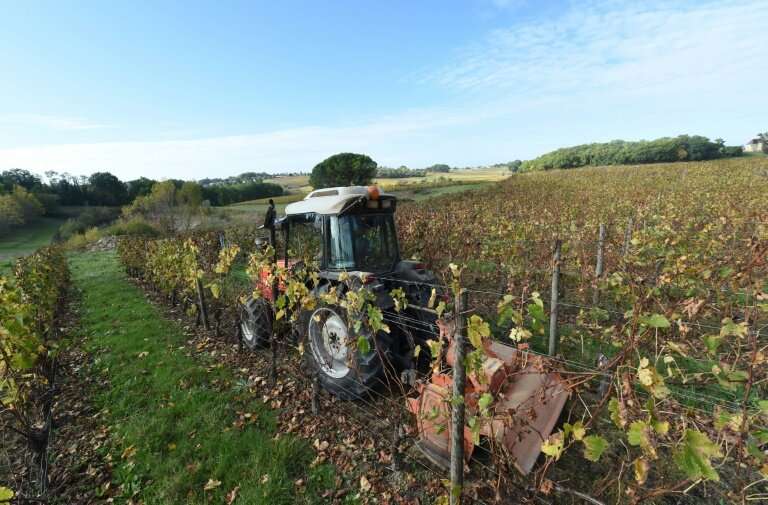French vineyards say ready to break glyphosate addiction

The vaunted terroirs of France's vineyards have for decades been saturated with the world's most widely used weedkiller, but grape growers say the day is soon coming when glyphosate will no longer be part of the fine wine process.
President Emmanuel Macron has challenged the industry to stop using the herbicide—considered "probably cancerogenic" by the World Health Organization's cancer agency—faster than anyone else.
"I think we can have the first vineyards in the world without glyphosate, already the transition is going to happen in 80 percent of cases," Macron said during a marathon visit to France's annual agriculture show in Paris last weekend.
He had initially pledged to completely outlaw the weedkiller, most widely known under Monsanto's Roundup brand, by 2021, though Macron admitted last month the target was probably too ambitious.
Many winemakers accept they need to wean themselves off the powerful chemical, acknowledging the growing demand for more natural and organic food and wine among global gourmets.
But they warn that without help, the transition to alternatives might be slower than what Macron has in mind.
"We're going to stop using glyphosate, that's certain—it's what society wants. But it's not clear exactly when," said Bernard Farges of Bordeaux, president of the CNAOC wine and spirits association.
"We can move very, very quickly to quit using glyphosate, as quickly as we get state aid," added Jean-Marie Barillere of the CNIV national winemakers' association.
Tall order
Under scrutiny for years over suspected links to cancer, glyphosate was narrowly renewed for use in the EU in 2017, over the objections of France and eight other member states.
Recent studies have discovered trace residues of the chemical in bottles of popular reds and whites, though many scientists say the levels are far too low to pose a human health risk.
Most French winemakers, ever mindful of the phylloxera epidemic that devastated their industry in the late 19th century, have spread huge quantities of glyphosate and other chemicals on grapes for the past 40 years.
Switching to so-called biocontrol methods can often prove more costly and less effective, some growers say, and might not be practicable in some regions.
"We have steep areas where it is impossible to work the soil with machinery, where we have to use chemical herbicides," said Jerome Despey of the FranceAgriMer agriculture body.
He cited the terraced vineyards of Larzac in southern France, an area known for cultivating wines of rare finesse, as particularly vulnerable.
"If we do not use glyphosate in this region, viticulture is over," he warned, estimating that up to a third of the 800,000 hectares (20 million acres) of vineyards in France would be unable to give up the chemical completely.
'A gun at our head'
French vineyards had already pledged in 2017 to cut glyphosate use in half within three years, but industry leaders say they're moving faster.
"Purchases of biocontrol products for vines have increased by 70 percent in the past three years," Farges said, citing a "collapse" in sales of traditional weedkillers.
"Reducing herbicide use by 100 percent in three years is impossible, but we'll cut it by 70 percent," he predicted.
At the same time the industry will also cut by 70 percent its use of chemicals known for being carcinogenic, mutagenic, or toxic for reproduction—so-called CMR substances.
"But let's face it, we've done this because we had a gun at our head," Farges said, noting the pressure from alarming media reports and environmental advocates.
Monsanto is again in court in California this week after a gardener claimed he developed non-Hodgkin's lymphoma after years of spraying Roundup on his garden.
The trial follows last year's groundbreaking state-level trial brought by a school groundskeeper with the same condition, who was awarded $78 million in punitive and compensatory damages and other costs, a decision Monsanto is appealing.
Barillere of the CNIV said getting rid of glyphosate will be easiest for the highly structured winemaking operations in Bordeaux, Champagne and other big-name regions.
Growers elsewhere, such as the Loire Valley with its distinctive whites, will have to organise in order to "get the machine moving", he said.
© 2019 AFP





















